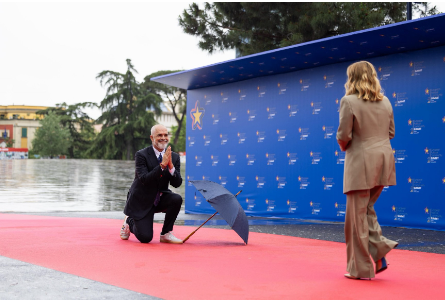TIRANA, Albania — In a moment that blended diplomatic theatrics with intentional symbolism, Albanian Prime Minister Edi Rama knelt before his Italian counterpart, Giorgia Meloni, during the sixth European Political Community (EPC) Summit in Tirana. “He just wants to be as tall as I am,” Meloni quipped, responding with lighthearted humor to the scene. Yet beyond the humorous gesture, the summit was marked by serious discussion on Europe`s strategic challenges: migration management, regional security, and a unified stance on the war in Ukraine.
Meloni’s visit to Tirana carried deeper significance than ceremonial protocol. It took place in the context of a controversial bilateral agreement between Italy and Albania, signed in November 2023, which foresees the construction of a migrant processing center in Gjadër, Lezha. The center will house third-country nationals intercepted in Italian waters who do not immediately qualify for asylum. While Meloni stated she had not yet visited the site, she assured that work is progressing rapidly — a sign, she claimed, that the project is on the right track. The Albanian government has presented the cooperation as a gesture of strategic partnership with Italy, though human rights organizations have raised serious concerns about legal safeguards and the outsourcing of EU asylum responsibilities.
This EPC summit — the first to be held in the Western Balkans — was a symbolic step, affirming the EU’s commitment to regional integration and its vision for a reshaped geopolitical map of Europe.
Over 40 heads of state and government, including French President Emmanuel Macron and German Chancellor Olaf Scholz, convened under the slogan “A New Europe in a New World.” The message was clear: the continent is leaning toward a more flexible, politically integrated, and crisis-responsive European order. For Giorgia Meloni, the summit was an opportunity to reaffirm Italy’s active role in European foreign policy. She arrived in Tirana with a mix of pragmatism and strong positioning — whether on migration, or the war in Ukraine.
Whereas on the issue of Ukraine, Meloni struck a more somber tone. She emphasized the need for the EU to push for a peace agreement that provides robust security guarantees for Kyiv, rejecting half-measures or superficial ceasefires. This reflects Italy’s ongoing support for Ukraine’s territorial integrity while acknowledging growing war fatigue among European publics and policymakers alike.
Rama’s performative gestures have become a hallmark of his diplomatic style. Kneeling before Meloni may have seemed impromptu, but it reflects his skill in drawing international attention — and putting Albania squarely on the map of strategic conversations. Critics at home and abroad view such moments as a smokescreen for domestic issues — stalled reforms, corruption, and economic stagnation. Yet, from another perspective, Rama’s ability to blend showmanship with real diplomacy is part of what has made Albania a relevant and sought-after partner in European politics.
The Tirana summit left behind two powerful images: a viral moment of humour and a construction site in Gjadër that embodies Europe’s evolving approach to border control. Meloni left Albania with both symbolic and practical wins — deepening ties with a key partner and securing tacit support from European leaders for her migration agenda. The European Political Community is still a forum in the making. But if the Tirana summit revealed anything, it is that Europe is actively reimagining itself — blending symbolic diplomacy with strategic interests in an increasingly complex global landscape.
Written by our correspondent A.T.



